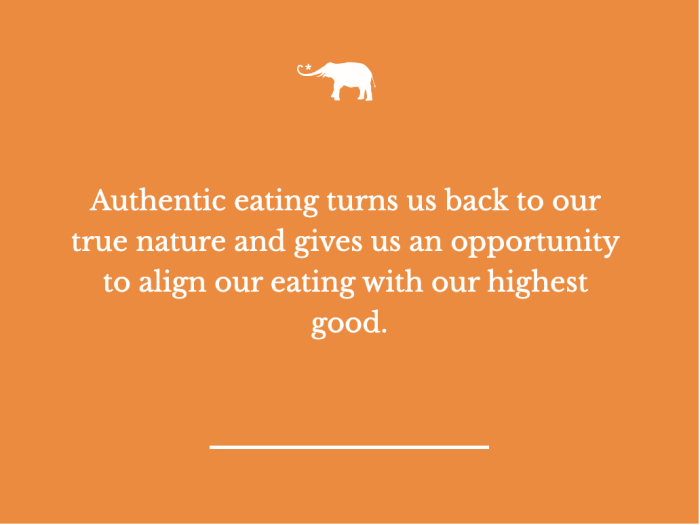If you are like me, you strive to bring authenticity to everything you do.
Yet, how we eat and how we nourish ourselves can feel like one of the most complicated and overwhelming things we do in our daily lives.
Before we dive in, let’s start with a deeper look into the word authentic. The root word is the Latin auto meaning self and the word authenticus, meaning acting with one’s own authority. Authentic then means a genuine authority and sovereignty within one’s self.
Authentic eating is just this within our eating and our health: A body-centered and real-time approach to nourishing ourselves that is acting within our sovereignty through the intelligent root within our bodies –– the very birthplace of our greatest power.
In the case of our eating, our authenticity turns us back to our true nature and gives us an opportunity to align our eating with our highest good.
Therefore, authentic eating is an internal approach to our eating, rather than the more common cultural external approach to eating that does not consider our unique and dynamic needs, our innate primal wisdom, and the many fluid aspects of our being.
Through my own self-study and through observing hundreds of eaters over the past two decades in my private practice, Boulder Nutrition, I have distilled down some authentic eating touchstones to help us all along.
WHY TRY AUTHENTIC EATING:
- Your Body Is Your Ally
When we allow ourselves to eat aligned with the elemental cycles of nature around us and within us, we begin to see our authenticity and body wisdom as our truest ally. There is nothing I have seen that is more true and authentic than our body sense.
Because authentic eating looks different for each of us, we each may need to clear some cultural and social beliefs about what we think we should eat (and how we should look), to turn towards what is true for us as individuals in the name of our well-being.
- When we eat in harmony with natures cycles, we create a regenerative approach to eating within us.
The more we feel into the elemental cycles around us, present in nature, the more we can understand these cycles and rhythms within ourselves –– because we are nature. This knowing has always been embedded in our cellular DNA and our innate primal wisdom.
With natures rhythms around us and within us as our primary guidance system, we can begin to soothe and remedy our lives – healing the way we eat and live.
- We don’t have to pick one eating style or commit to one way.
It is common to strive for a static approach to eating via trendy eating styles, personal rules, and unrealistic expectations. The problem with this model is that is is not sustainable nor regenerative, and most often leaves us more disconnected from what we actually need to be nourished.
Authentic eating is a dynamic approach to eating –– one that is fluid, freeing, and attuned with our bodies, minds, hearts, and souls.
HOW TO BEGIN:
- Honor Your Physical Hunger And Satiation
Physically, hunger and satiation have become challenging cues to read and listen to. Many of us have a lot of other triggers wrapped up in these two primal cues: these include body weight, desire, comfort, punishment, pleasure, and feelings of being out of control. With practice in becoming the witness in our bodies, we can begin to unravel ourselves from the very paradigms that keep us stuck, to create a more genuine tracking of our physical sensations.
Additionally, different aspects of our lives can biochemically impact our hunger and satiation. For example, a stressful day or a rough night of sleep both increase our hunger hormone, ghrelin. This leaves us more hungry, and more often reaching for comfort food. This is hormonal. I share this with you so you can begin to shed any guilt and shame you might feel as these primal cues flux and shift.
In a culture tells us to keep on the move, keep busy, and focus on being productive, we often find ourselves a stranger to our hunger and satiation cues all together.
When eating is a body-centered inquiry, eating can become nourishing and embodied experience.
Try This:
- Around the table, give yourself some space to track into your physical hunger and fullness cues. Notice the physical nuances of sensations that occur within hunger and fullness, as well as any emotional responses to each. Notice any cultural norms, or individual belief systems that you hear on repeat within your relationship to your hunger and fullness.
- If your cravings feel way off, (for example due to stress or lack of sleep) try upgrading your ingredients. For example, consider a change of sweeteners from white sugar to coconut sugar or monk fruit, or a change of flours from white flour to casava or almond flower.
Respect Your Body
Respecting our bodies within our eating involves feeding ourselves in a way that leaves us energized, uplifted, inspired, satiated, and loved.
Rather than eating for the dissatisfaction of our bodies, we can practice eating for the love of them. This includes tending to our blood sugar, our metabolic health, our wise cravings, and the many nuances that can make a significant difference in how we feel. Additionally, we are all unique. How you feel after a cup of really strong coffee, or a sugary treat may be very different than me. How you feel after a grass-fed piece of steak or a yummy bowl of vegan lentil soup might be very different than your sister.
Learning to eat to feel how you want to feel is a practice that we can hone over time.
Try This:
- Take note of how you feel after eating different foods? For example, how does protein make you feel. How does high quality fat make you feel. How do carbohydrates make you feel. How about the combination of all three macronutrients at a meal?
Find a Practice That Supports Your Mind-body Connection.
Our mind-body connection increases both our sensitivity to sensorial experiences inside the body as well as our perception of these signals –– also known as interoception.
One of the most valuable tools we can hone as an authentic eater is our mind-body connection.
There are many proven ways to elevate the mind-body connection (or interoception).
Try This:
- Incorporate daily downtime for reflection and rest
- Spend some time in nature each week.
- Practice an awareness art regularly such as yoga, meditation, reflective journaling, tai chi, or forest bathing,
- Create a consistent morning ritual, intention practice, or gratitude practice. (even if you only have 5 min)
- Align Your Eating With Your Soul
There is more going on within our eating than solely the cues within our physical bodies. Our eating can have a soulful and ritualized quality that impacts how we feel in relationship to it.
We can experience a deep sense of personal fulfillment when food resonates with our souls. For example, where we source our food (I love to know my farmers!), how or with who we cook our food, and the environment around our tables all have possibility to create a soulfulness with in us.
Food can be a path to a deeper spiritual relationship with ourselves and with the world we live in.
Try This:
- Create an eating ritual to amplify your pleasure during mealtime, such as lighting a candle, practicing gratitude, sourcing your food locally, or setting a beautiful seasonal table.
- Notice your senses while you eat. Your senses are your vehicle for pleasure. When you are present with your senses in real-time, you can elevate the pleasure within your eating.
We are a culture that often looks outside of ourselves for answers in many domains of life. Try turning inward towards your most authentic self to trust the intelligence within you –– with food and with life!









Read 0 comments and reply